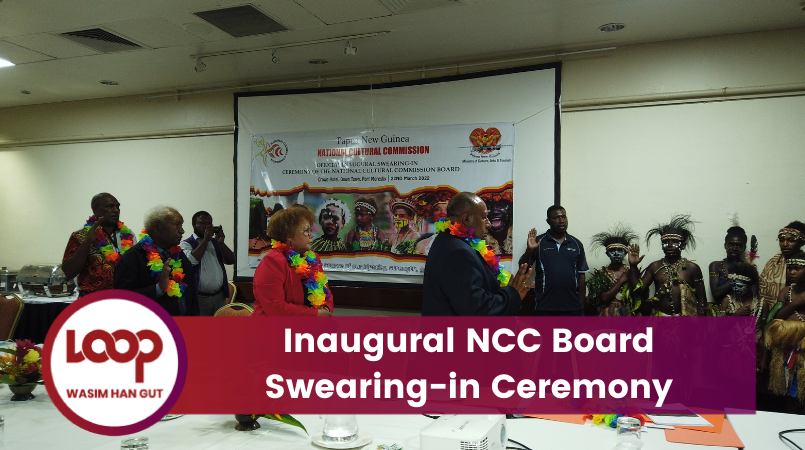
The National Cultural Commission (NCC) Board, comprising eight members, was sworn in yesterday (22nd March). Officiating the honors for the event from the Administration of Oath of Office was District Court Magistrate, Billy Pidu.
The NCC was established by an Act of Parliament on 27 October 1994 to preserve, promote, develop and safeguard the tangible and intangible cultural heritage of the country.
The Executive Director heads the Commission and the Commission’s Board according to respective Acts guides its cultural functions.
It has been six years since the last swearing-in ceremony of the old board on 14 April 2016 and the National Executive Council endorsed it on the 12th of October 2021, the new board sworn in speaks of the direction of change that is forthcoming.
In the recent flurry of activities, the country has observed so many landmark initiatives delivered by the NCC, one of the best performing state agencies in PNG, under the guidance and leadership of Minister Isi Henry Leonard, the Chairman of the board Ivan Pomaleu and NCC Executive Director Steven Kilanda.
The members sworn-in each hold outstanding reputable caliber respectively in their professions. The composition of the Commission Board are as follows:
Ex Officio Members: AMB. Ivan Pomelau – Chairman, Prof. Leo Marai – Deputy Chairman, Dr. Andrew Moutu, Joseph Auli, and Mr Kilanda.
Non-Ex Officio Members: Dr. Michael Augustine Mel, Akii Tumu, Janet Roland Sios
During the press interviews Mr Kilanda, explained why it had taken 6 years to have a board sworn.
“There are two reasons, the first being the Appointment process as it is lengthy and the second is political interference. With the current Minister, he allowed the process to take place and he listened to advice so that we have appointed the right people, and with the follow up you have to commit on the appointment process and see it go through to NEC.”
With the appointment of a full board, Mr. Kilanda told the media, “Previously we were relying on sister agencies like the National Museum among others and when I came in there was no corporate plan. When we created the corporate plan that plan itself is supposed to be endorsed by the board. Now that we have a board their first point of business is to endorse the policy.”
Minister Leonard spoke highly of the members sworn-in and with the achievement that has eventuated under his watch, gave his thoughts on the elected board and the way forward.
“I see a way forward with this board comprised of people of high caliber that will provide their technical expertise and sound advice. Tourism is a lot more than what people think it is, it is about people and the environment and the NCC holds that very important responsibility. This board will allow NCC to participate and provide guidelines and directives especially to the Minister responsible, because I want to see Tourism to evolve to the next level.”
He also acknowledged the Marape-led government and the National Executive Council.
“I say this because when we were aligning the budget I challenged the government and NEC that for a long time we have ignored and only provided lip service acknowledging that Tourism Arts & Culture is a sleeping giant, and nothing in terms of resource. For the first time the government that I am a part of and my Prime Minister that I serve under acknowledged the significance and importance of the Ministry that I hold and this year they have given us K20 million to Tourism Promotion Authority.”
He said this indicated that the government realizes and understands the work that is being done by Tourism Promotion Authority and NCC.
Ambassador Pomelau told the board and media that one could talk about things the government could do but Culture, Art, Song and Dance are the things that touch the people.
“We all have something to offer in that space and on that basis it’s important that whether you are a business person or high end academic or a public servant like myself, we make a contribution to this space because that’s where we retire back to. We retire back to our villages and we are bound by the customs and cultures that are prevalent in those spaces.”
